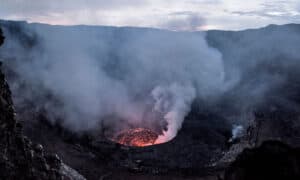Carnivorous barracuda fish are scientifically called Sphyraenidae, but they’re commonly known as ‘cudas or tigers-of-the-sea due to their razor-sharp teeth and ability to hunt pretty much anything living in the water. There are plenty of barracuda in Florida, but how big do they really get and how can you catch one? Let’s discover the largest barracuda ever caught in Florida and who snagged it.
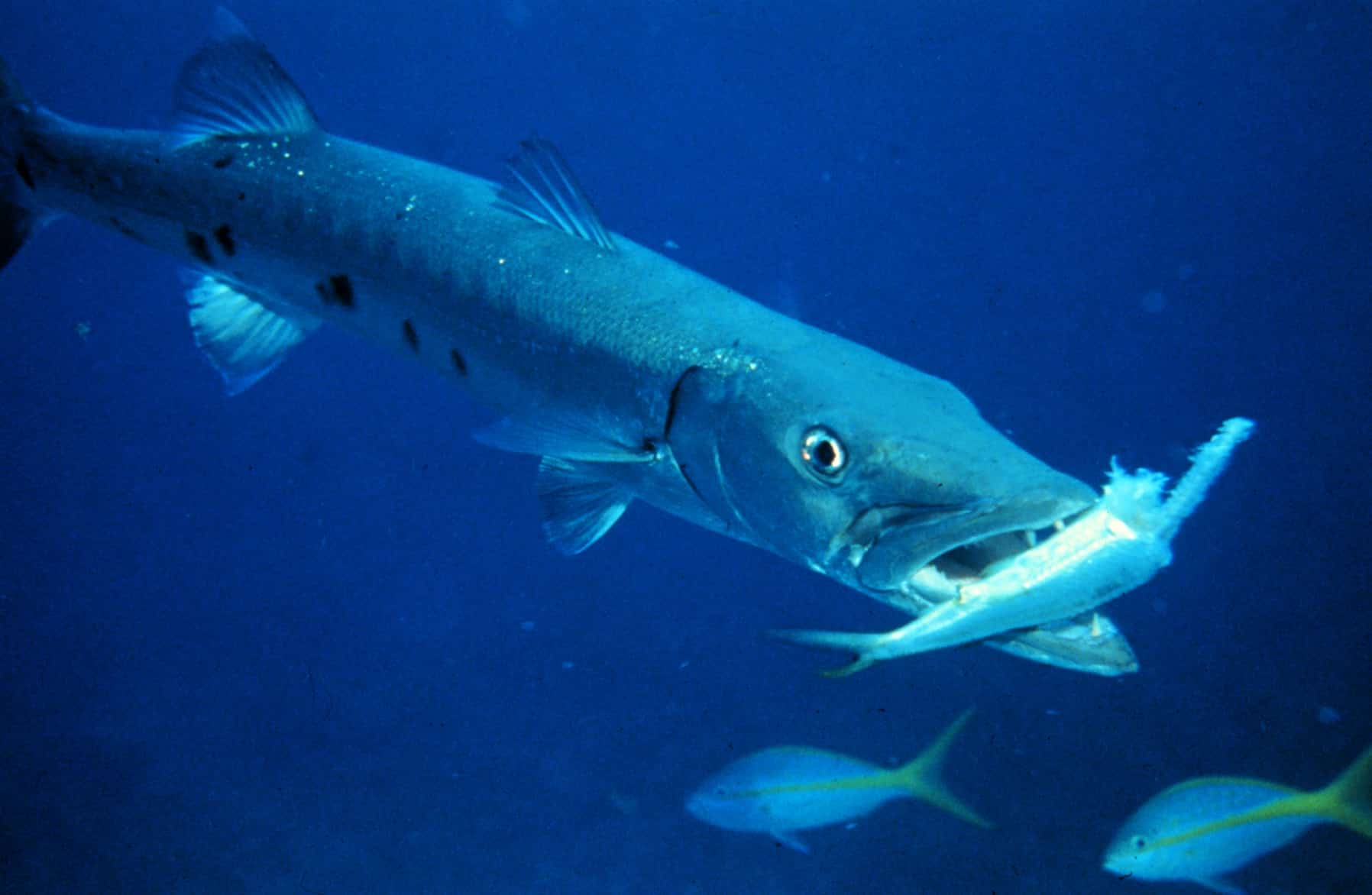
Carnivorous
barracuda
fish are scientifically called
Sphyraenidae.
©Florida Keys National Marine Sanctuary / Public domain, from Wikimedia Commons, the free media repository – License
What Is The Largest Barracuda Ever Caught In Florida?
The largest barracuda ever caught in Florida was a great barracuda (Sphyraena barracuda pronounced ss-ferry-ena). It weighed a huge 67 pounds.
Harold K. Goodstone caught it on January 29 1949 near Islamorada, Florida Keys. There’s not much information about how he caught it or what tackle he used, but we can assume it was a rod-bending fight.
Given the biggest barracuda ever caught weighed 102 pounds, there’s still everything to play for if you’re fishing for Barracuda in Florida!
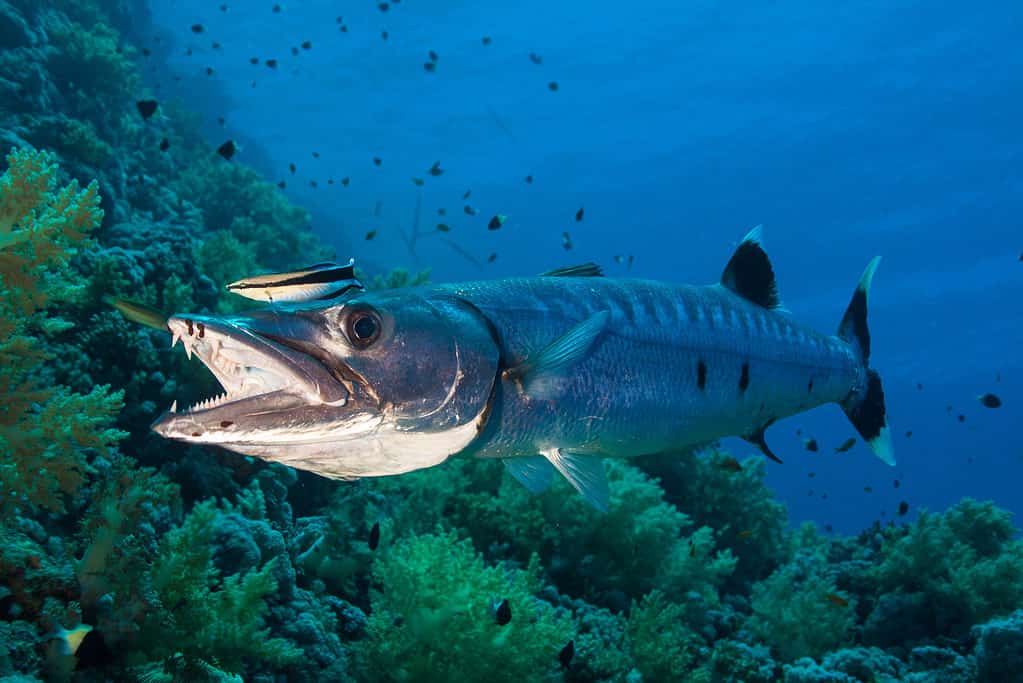
The largest barracuda ever caught in Florida was a great barracuda (Sphyraena barracuda pronounced ss-ferry-ena). It weighed a huge 67 pounds.
©Itstvan Kovacs/Shutterstock.com
What’s The Biggest Fish Ever Caught In Florida?
Florida is a hot spot for enormous freshwater and saltwater fish. If you’re looking to snag a prize winner, here’s what you’ll need to beat.
Largest Freshwater Fish Caught In Florida
The largest freshwater fish ever caught in Florida was a 132-pound alligator gar. It was caught by the U.S. Fish and Wildlife Service and FWC researchers in the Yellow River.
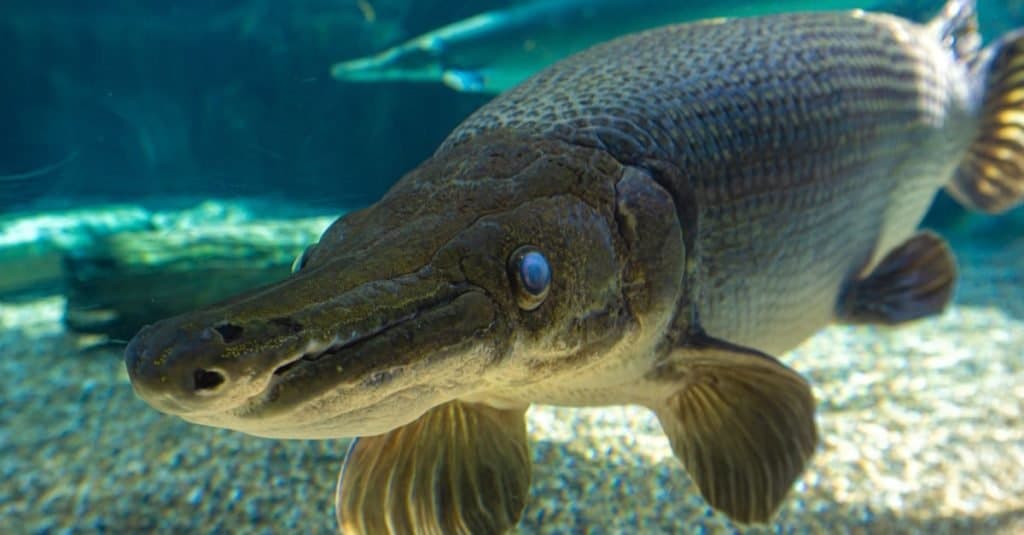
The largest freshwater fish ever caught in Florida was a 132-pound alligator gar.
©TKBackyard/Shutterstock.com
Largest Saltwater Fish Caught In Florida
The largest salt water fish ever caught in Florida was a 1,069.06-pound tiger shark on June 20 1981 by Richard Braggs off Pensacola.
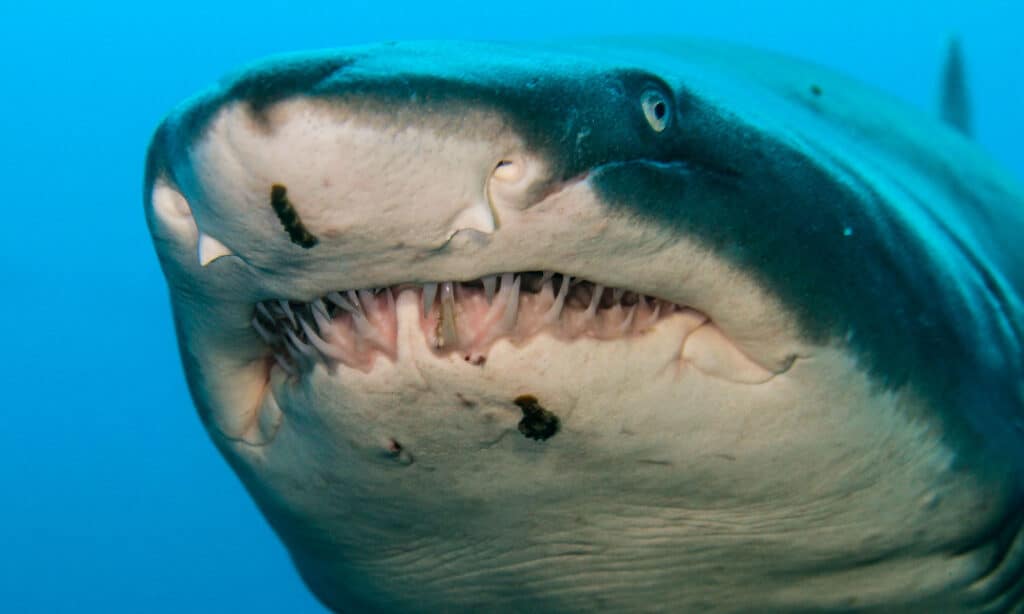
The largest salt water fish ever caught in Florida was a 1,069.06-pound
tiger shark
.
©Michael Rothschild/Shutterstock.com
Discover The Largest Barracuda Ever Caught (its not in Florida!)
The largest official barracuda ever caught in the world was snagged in the Kwanza River, Angola, southern Africa by United States angler Thomas Gibson in 2013.
The Guinean barracuda weighed a whopping 102.8 pounds (46.4 kilograms) and was just over six feet 10 inches long.
This massive ‘cuda took the world record from Dr. Cyril Fabre, who hooked a 101.3 pounder (45.9 kilograms) in Gabon, Africa in 2002.
Thomas Gibson caught his record-breaking barracuda with light tackle spinning a 10 pound braided line and Rapala lures. It took just ten minutes to reel it in! Gibson said when he first hooked the record breaker it was so large he wasn’t sure what it was, but it resembled a crocodile without any legs!
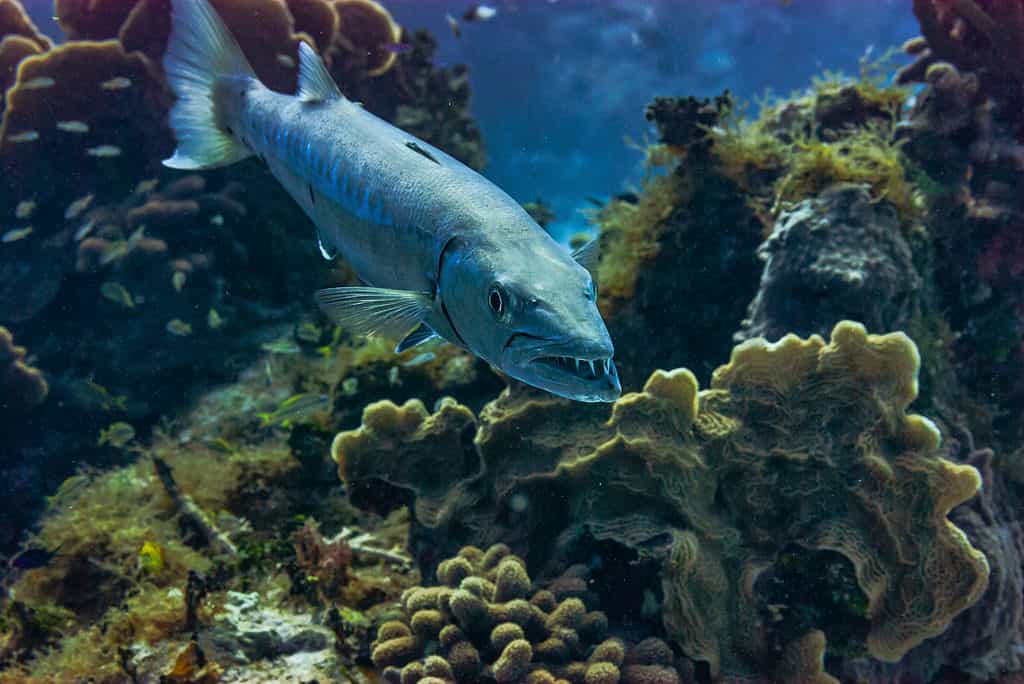
Great barracuda showing off its teeth.
©Focused Adventures/Shutterstock.com
How Big Do Barracudas Get?
There are 26 species of barracuda in the world, ranging in color and size but they are all voracious predators. Species include yellowtail barracuda, pick handle barracuda, and great barracuda.
The large barracuda ever caught in Florida was a 67-pound great barracuda, but this species can reach five to six feet long and weigh more than 100 pounds, so there’s everything to fish for!
Barracuda can live up to 14 years in the wild given they have barely any predators once fully grown.
What Do Barracuda Fish Look Like In Florida?
The great barracudas of Florida are one of the largest barracuda species.
They are pale white beneath and blue-gray on top with dark cross bars present on adult fish. They have second dorsal fins plus white tips on their anal and caudal fins.
But it’s a barracuda jawline that readily identifies it as a ‘cuda. They are predatory fish with a jutting bottom jaw and sharp pointed teeth of different sizes.
Overall, barracuda resemble large pike and they have the attitude to match.
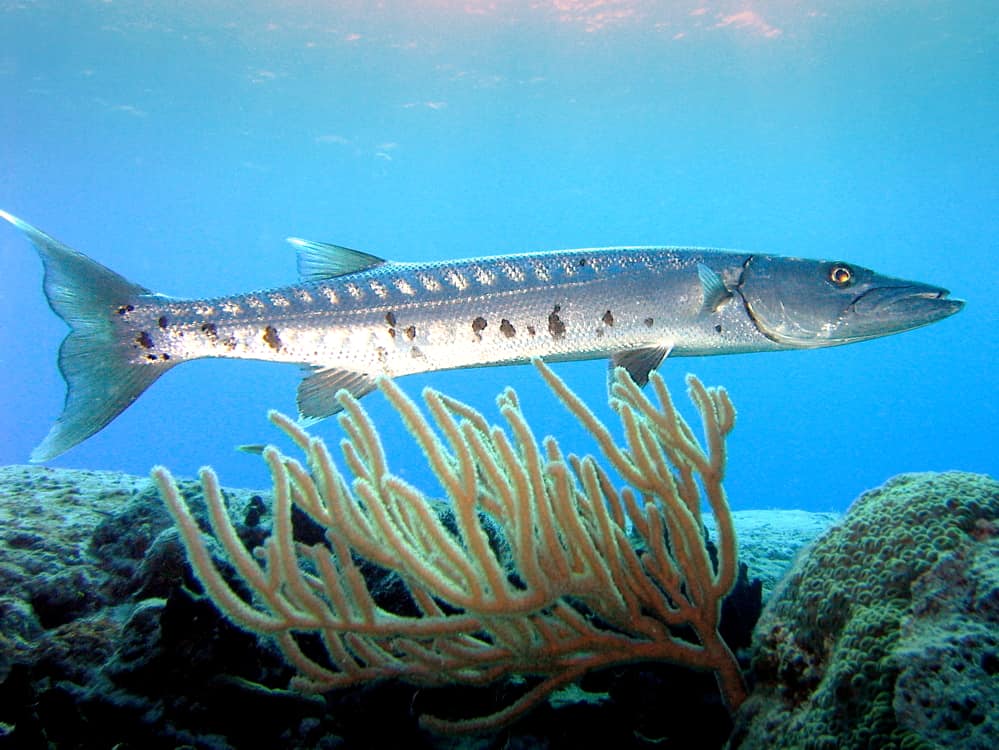
The great barracudas of Florida are one of the largest barracuda species.
©Laban712 / Public domain, from Wikimedia Commons, the free media repository – License
Discover What Tackle Catches Barracuda In Florida
Experts say great barracuda are the species swimming around Florida’s waters, but this is a massive fish when fully grown, so serious tackle is required to reel in the largest.
Local boat fishermen suggest a steel trace because ‘cuda teeth are razor sharp plus a range of trolled or cast lures or baitfish used for commonly caught tarpon. Barracuda are curious fish and because they have few predators, they will investigate most flashing lures or meat baits.
However, they are clever! If they test a lure and don’t take it, they rarely come back for another try. That’s why you need a range of different lures.
Although specialized tackle isn’t required to catch Florida’s barracuda, a sturdy rod is essential because barracudas fight and leap. Although this is why fishermen enjoy a barracuda hunt, it can lead to broken tackle. A medium-weight 20-30 pound setup should do the trick unless you hook a record-breaking heavyweight!
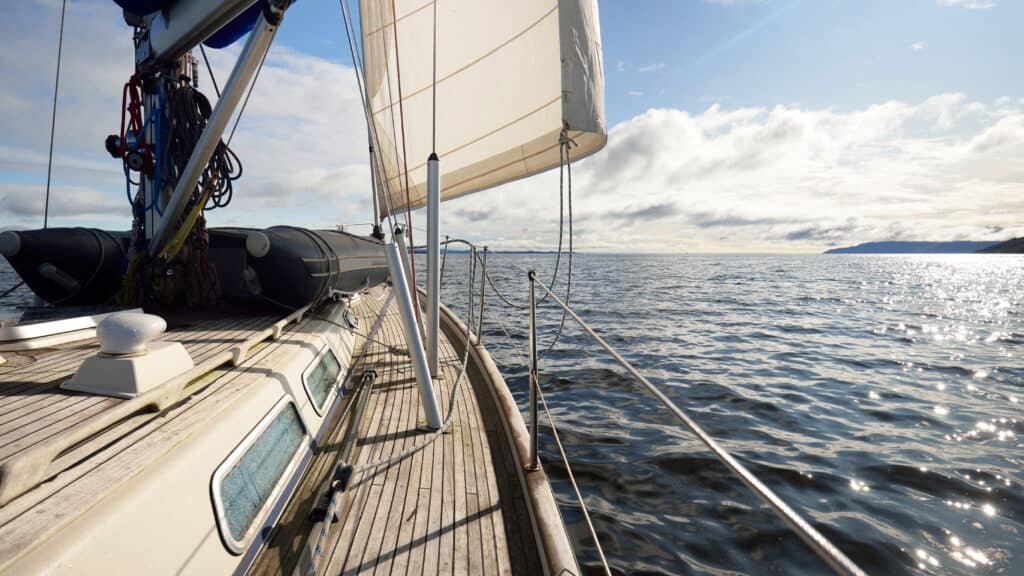
Large adults hunt in the open ocean down to 135 feet (100 meters).
©Alex Stemmers/Shutterstock.com
Where To Find Barracuda In Florida
Juvenile predatory barracuda hunt small baitfish such as snapper, grunts, mullets and bream in shallow water flats near seagrass beds, mangroves, and coral reefs, but larger adults also hunt in the open ocean down to 135 feet (100 meters).
They usually hunt alone, but when prey is plentiful, they congregate, snatch, and cause a commotion. In general, adult barracudas don’t like brackish waters.
They are clever fish, so you’ll spot barracuda taking hooked fish from a line. Adult barracuda will also herd a school of baitfish, guarding them until they’re ready to eat again.
Has A Barracuda Ever Killed Someone In Florida?
It’s rare but yes. In 1947 a barracuda caused a fatality in Florida’s Key West.
In 1957 barracudas killed a person off the North Carolina coast, and in 1960, a barracuda attacked a free diver off Pompano Beach, Florida giving him such ferocious bites that 37 stitches were needed to patch him up.
Divers’ blogs are full of stories about barracuda attacks that take chunks of flesh or fingers, so don’t underestimate them.
Killer barracudas are not a frequent issue, and most attacks happen if they mistake humans for prey. Divers should avoid using shiny objects like diving knives in their presence because this attracts attention.
If you’re safely on a boat, look out for their razor-sharp teeth and hard thrashing bodies once landed. Barracudas have some teeth angled backward so small fish can’t escape their grasp. These teeth can cause deep lacerating wounds.
What Preys On Barracudas In Florida?
A five to six feet long barracuda has very few predators save large sharks, tuna, goliath groupers, and fishermen, but young barracuda are prey to most predators on Florida’s coast and freshwaters.
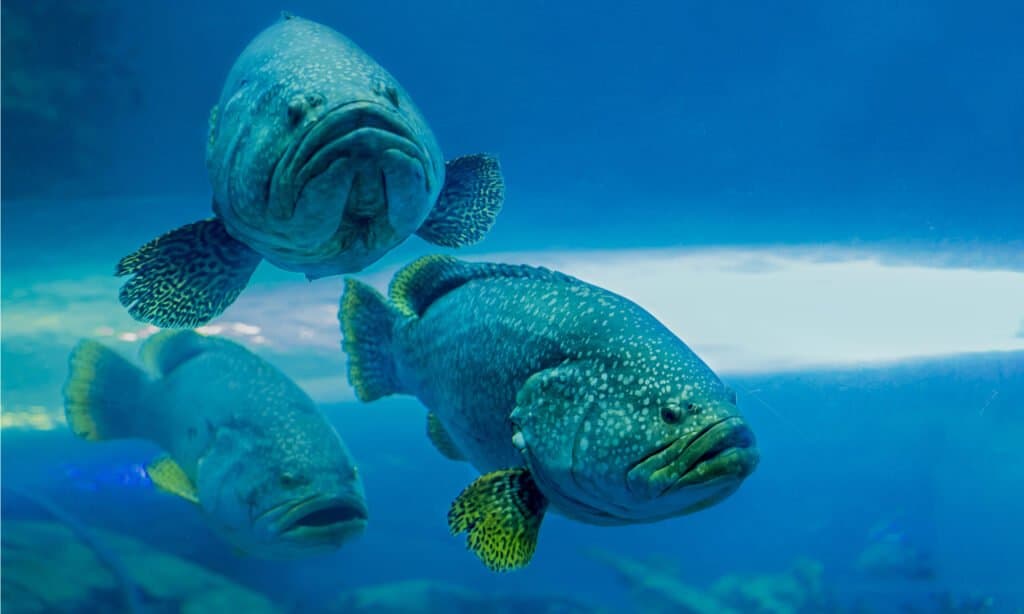
The giant
grouper
is one of the few predators of barracudas.
©Supermop/Shutterstock.com
Can Eating Barracuda Make You Sick?
Juvenile barracuda make good steak, fillet, or smoked eating fish, but it’s sensible to avoid eating large barracuda because studies show they can contain high amounts of mercury and cadmium. When humans eat this, it can cause ciguatera poisoning (CFP).
Large barracuda have more time to build up toxin levels, that are directly passed onto whoever eats them. Symptoms of ciguatera poisoning from predator fish include diarrhea and vomiting, dizziness, feeling hot and cold, numbness, and itchy skin. It can produce symptoms within half an hour of eating and the vomiting and diarrhea can last for days, but symptoms can last for weeks or months.
Other fish that can potentially cause ciguatera poisoning include moray eel, grouper, tuna, sea bass, mackerel, and hogfish. Experts say CFP is one of the most common seafood toxin illnesses.
What Are The Best Places To Catch Barracuda In Florida?
Great barracudas are plentiful around Florida. They are in most shallow or deep water environments around Miami, Miami Beach, Biscayne Bay, Everglades National Park, and the Florida Keys. These spots regularly turn up barracuda from one to three feet, with up to five feet barracuda spotted on occasion too.
The Florida Fish and Wildlife Conservation Commission (FWC) has imposed regulations on harvesting barracuda, so most barracuda hunting boat trips consider them a catch-and-release species.
Any caught barracuda under 15 inches must go back into the water and take just one harvested barracuda over 36 inches per day or per vessel (whichever is less).
The new limits apply to six southern Florida counties:
- Monroe
- Miami-Dade
- Collier
- Broward
- Palm Beach
- Martin
The limits are in place because the number of barracuda around Florida is decreasing, but there are still large barracuda out there. If you’re ready to pack your rod and discover the largest barracuda ever caught in Florida, you’ll break a record held since 1949.
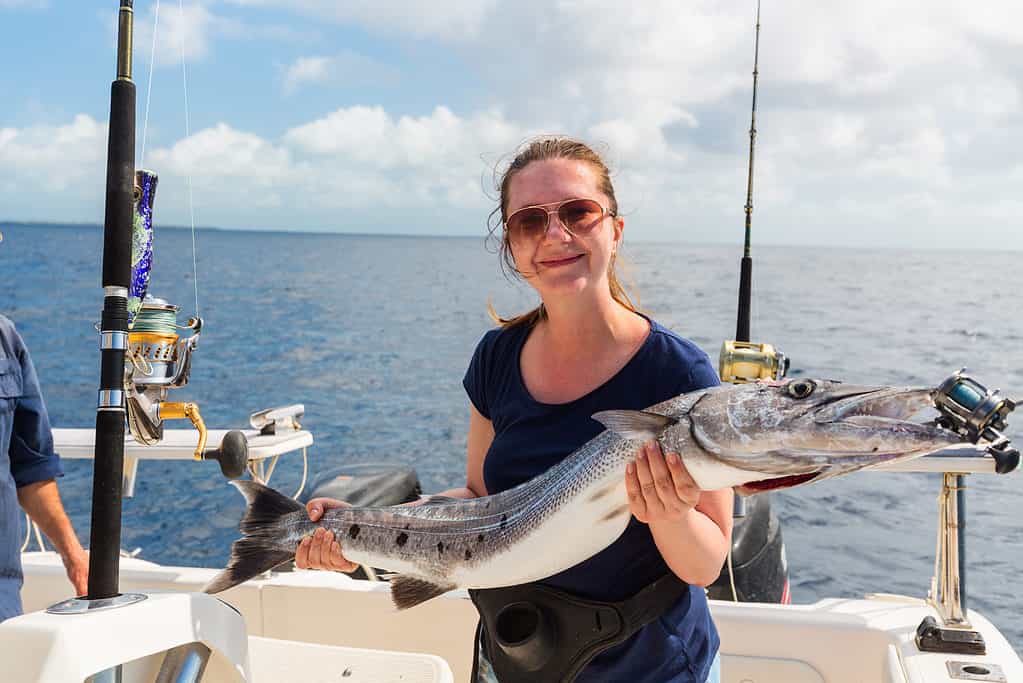
Great barracudas are plentiful around Florida.
©BlueOrange Studio/Shutterstock.com
Where Is Florida Located On A Map?
Florida is in the southeastern region of the United States and is bordered by Alabama to the northwest, Georgia to the north, the Gulf of Mexico to the west, and the Atlantic Ocean to the east. The Florida Keys are a 125-mile-long chain of islands located south of Miami and are in the Atlantic Ocean, Florida Bay, and the Gulf of Mexico.
The photo featured at the top of this post is © aquapix/Shutterstock.com
FAQs (Frequently Asked Questions)
What is the largest barracuda ever caught in Florida?
The largest barracuda ever caught in Florida was a great barracuda (Sphyraena barracuda pronounced ss-ferry-ena). It weighed a huge 67 pounds.
What is the largest barracuda ever caught in the world?
The largest official barracuda ever caught in the world was snagged in the Kwanza River, Angola, southern Africa by United States angler Thomas Gibson in 2013. The Guinean barracuda weighed a whopping 102.8 pounds (46.4 kilograms) and was just over six feet 10 inches long.
Thank you for reading! Have some feedback for us? Contact the AZ Animals editorial team.





